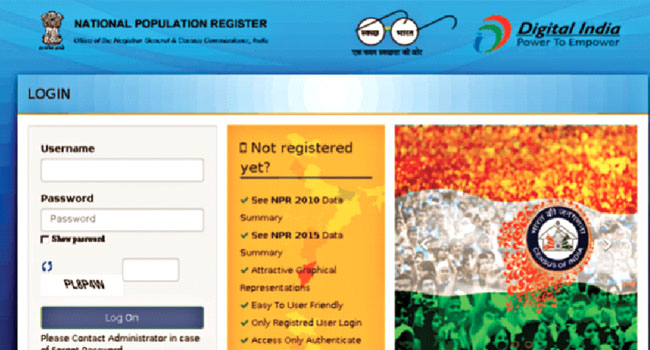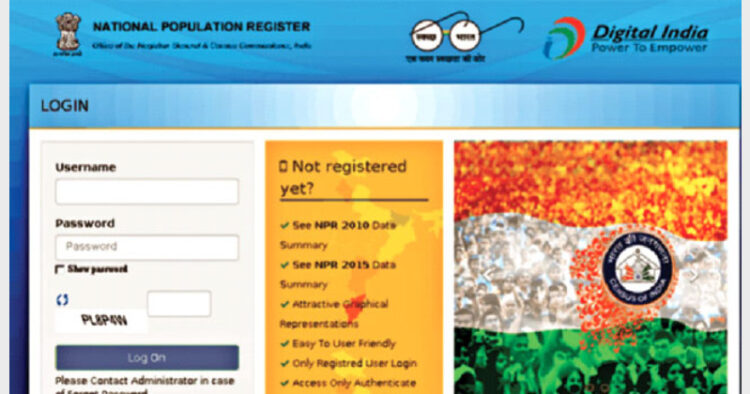
NPR will help in better implementation of the Central and State Government Schemes as identification of the beneficiaries would become easier
Partha Pratim Mazumder
It was very clear in 2003 itself when the central government issued the Citizenship (Registration of Citizens and Issue of National Identity Cards) Rules, in which the process for National Population Register (NPR) was explained. The data for NPR was collected in 2010 along with the house-listing phase of the Census of India 2011. The updation of this data was done during 2015 by conducting door to door surveys and digitisation of the data of 1.17 billion people, which was 97 percent of the country’s population then. Also, biometric details of 40% of these people have been linked with NPR data. So, the government now has to update NPR and link Aadhaar of the remaining 60 percent of the population. While the Census will be conducted in 2021, the NPR update will take place from April to September 2020 in all the States/UTs except Assam. According to the sources, the Union Cabinet has approved a proposal of the Home Ministry to spend Rs 8,754 crore for the Census 2021 and Rs 3,941 crore for updating the NPR.
The NPR is a register of residents of the country. It is mandatory for every resident of India to register in the NPR. It includes both Indian citizens as well as a foreign citizen. The objective of the NPR is to create a comprehensive identity database of every usual resident in the country. The first National Population Register was prepared in 2010 and updating this data was done during 2015 by conducting door to door surveys. The next update of the NPR will take place next year from April to September with the House listing phase of the Census 2021. It is being prepared at the local (Village/sub-Town), sub-District, District, State and National level under the provisions of Citizenship Act 1955 and the Citizenship (Registration of Citizens and Issue of National Identity Cards) Rules, 2003.
Difference between NPR & NRC
According to the Citizenship Rules, notified on December 10, 2003, NPR is ‘the register containing details of persons usually residing in a village or rural area or town or ward or demarcated area within a ward in a town or urban area. NRC is a register containing details of Indian Citizens living in India and outside India.
The information provided for NPR will be verified by a local Registrar appointed by the state government. Rules are clear on who are Indian citizens – all those born before 1987, those born between 1987 and 2004, whose at least one parent is an Indian citizen and those after 2004, whose one parent is an Indian citizen and other is not an illegal migrant at the time of the birth. The particulars of individuals, whose citizenship is doubtful, would be marked with “appropriate remarks” by the Registrar in NPR and notices will be issued to such persons. A person will be heard by the Registrar before taking the decision on whether he or she will be part of NPR. The draft local population Register will be published for inviting objections. The Registrar will consider these objections and will take a final decision. The local population Register would be submitted to the District Registrar, where a person, whose claim has been rejected, can appeal. If the claim is accepted, the person’s name will be entered in the Register with “appropriate remarks” and submitted to the state for the National Register.
According to the Citizenship (Registration of Citizens and Issue of National Identity Cards) Rules, 2003, a usual resident is a person who has resided in a local area for the past six months or more or a person who intends to reside in that area for the next six months or more. The Census is the enumeration of the population of the country. It is being conducted at an interval of 10 years. The Census 2021 will be the 16th Census in the country since the first census happened in 1872. However, it will be the 8th census after Independence. For the first time, the Census 2021 will use Mobile App for data collection. It will also provide a facility to the public for self-enumeration.
The demographic details of every individual are required for every resident on 21 points which includes ‘date and place of birth of parents’, last place of residence, Permanent Account Number (PAN), Aadhar (on a voluntary basis), Voter ID card number, Driving Licence Number and Mobile Number. In the last NPR done in 2010, the data was collected on the 15 points and it did not include ‘date and place of birth of parents’ and last place of residence.
It is very clear that the NPR is different from the National Register of Citizens, which excludes foreign citizens. According to Citizenship (Registration of Citizens and Issue of National Identity Cards) Rules, notified on December 10, 2003, a Population Register is ‘the register containing details of persons usually residing in a village or rural area or town or ward or demarcated area (demarcated by the Registrar General of Citizen Registration) within a ward in a town or urban area. Whereas the ‘National Register of Indian Citizens’ is a register containing details of Indian Citizens living in India and outside India. The rules further say that ‘National Register of Indian Citizens’ shall contain the particulars of every citizen i.e. Name, Father’s name, Mother’s name, Sex, Date of birth, Place of birth, Residential address (present and permanent), Marital status and if ever married, name of the spouse, Visible identification mark, Date of registration of Citizen, Serial number of registration, and National Identity Number. In the 2011 Census, the NRC was to be a sub-set of NPR, which is a register of usual residents of a country. Unlike the NRC, the NPR is not a citizenship enumeration drive, as it would also include a foreigner staying in a locality for more than six months. After NRC, one would get a citizenship card with a unique identity number, which would not be the case with NPR.

Once NPR is completed, the Census Commissioner would notify local registrar for creating a National Register of Citizens (NRC) of India. The Registrar will seek information from individuals against whom remarks have been made in the NPR. They would be required to submit documents as sought by the Registrar. The Census Commission will remove the names of non-citizens for having a national NRC. A person declared as non-citizen can appeal with a ‘designated authority’ within 30 days of the Census Commissioner’s order. Going by present rules, it would be difficult. The NPR rules require states to notify the local, sub-district and district registrar and appeal authorities. The rules also seek help of municipal and rural local body officials help in conducting the NPR exercise. However, the Centre can get census data collection done by independent agencies but the verification is done by state government officials for authenticity.
I think NPR will help in better implementation of the Central and State Government Schemes as identification of beneficiaries using the NPR data would become easier. The NPR also lists the deprivation levels of individual households in the country. Many state governments use NPR data collected in 2015 to disburse government benefits.
(The writer is an Assistant Teacher
in Assam)













Comments